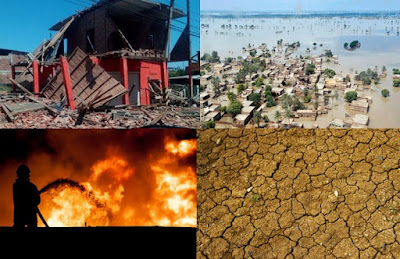What is disaster
A disaster refers to a sudden and significant event or series of events that cause widespread and often catastrophic damage, disruption, and loss of life and property. Disasters can be of natural or human-induced origin and can have severe impacts on individuals, communities, and even entire regions. They often overwhelm the affected area's ability to cope, requiring external assistance for response and recovery.
Types of disasters include:
1. Natural Disasters: These are events caused by natural processes and forces, such as geological, meteorological, hydrological, and biological phenomena. Examples include earthquakes, hurricanes, floods, droughts, wildfires, tsunamis, volcanic eruptions, and landslides.
2. Technological/Industrial Disasters: These result from accidents or failures in technological and industrial processes, such as chemical spills, nuclear accidents, explosions, and infrastructure collapses.
3. Environmental Disasters: As mentioned in the previous response, these disasters specifically refer to events that cause severe damage to the natural environment, ecosystems, and living organisms.
4. Human-Induced Disasters: These are disasters caused by human actions or negligence, such as wars, terrorism, civil unrest, and human-made environmental catastrophes like deforestation and pollution.
Disasters can have wide-ranging effects on communities and societies, including loss of life and injuries, damage to infrastructure and property, displacement of people, economic losses, and social and psychological impacts. Effective disaster management involves preparedness, response, and recovery strategies to minimize the negative impacts and help affected communities rebuild and move forward.
Governments, organizations, and individuals play essential roles in disaster management by implementing preventive measures, creating emergency response plans, establishing early warning systems, conducting drills and exercises, and offering humanitarian aid and support to affected populations. The goal is to reduce the risk and vulnerability to disasters and enhance resilience in the face of future challenges.
.jpg)


टिप्पणियाँ
एक टिप्पणी भेजें